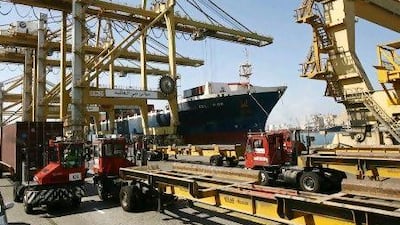Businesses in the UAE's fast-growing free zones were much more productive than companies outside them last year as they defied the economic volatility that rocked the rest of the world.
Are you the strongest link?
Business Quiz 2011 Do you have your finger on the pulse of business? Take our online contest for your chance to win brunch for two. Enter by January 1. Take the quiz
Free zones, which are tax-free and do not require business owners to work with a local partner, reported robust growth in the number of new ventures that opened last year.
Business grew more than 10 per cent across Tecom Investment's 11 clusters, while the number of new companies at Jumeirah Lakes Towers nearly doubled and now totals more than 4,000.
Jebel Ali Free Zone (Jafza), the country's oldest and largest free zone, said it now accounted for more than 21 per cent of Dubai's GDP - and nearly 8 per cent of the UAE's GDP.
Jafza also notes companies within Dubai's free zones are eight times more productive than businesses in the emirate, according to a survey it conducted with the Dubai Government.
Other emirates also benefited from a surge in free-zone growth.
More than 2,000 companies last year registered with Ras Al Khaimah Free Trade Zone (RAK FTZ), up 16 per cent from 2010.
"The exceptional growth in new registrations and renewals amid the challenging economic climate reflects investor confidence in our business model," said Oussama El Omari, the chief executive of RAK FTZ.
"Our outlook in 2012 remains positive," he added.
In all, about 40,000 businesses are situated in more than 30 free zones across the UAE.
Yet free-zone fever may be abating; some executives in the clusters claim business owners are becoming less optimistic and more cautious about moving in.
"The trend we're seeing is that the interest is still there, but companies are really studying the market very carefully and making different considerations before making their final call," said Marwan Abdulaziz, the director of business development at Dubai Healthcare City and DuBiotech.
The credit rating agency Standard & Poor's raised concerns last week when it warned Jafza may struggle to refinance US$2 billion (Dh7.34bn) in bonds due in November.
But Mohamed Al Janahi, the deputy chief executive of Jafza, was more optimistic."We are quite confident on the refinancing of the $2bn sukuk, which is the only outstanding debt.
"Jafza's management has commenced work on the liability management and it is currently exploring various refinancing options."
For now, cluster executives are busy trying to attract new tenants.
Jafza expects to grow 3 to 5 per cent this year, which is on track with last year's average.
Officials at the Khalifa Industrial Zone Abu Dhabi (Kizad) said last month they had secured $5bn in committed projects ahead of its formal opening, which is set for the last quarter of this year.
Kizad sprawls across 417 square kilometres - about two-thirds the size of Singapore. It is a hybrid free zone where only some business owners will fully control their firm. Unlike other zones, which have catered more to attracting international heavyweights, Kizad has focused on global players as well as local companies.
"The home market [in] the UAE, or GCC in general, is by far and away the biggest taker up to now," said Tony Douglas, the chief executive of Abu Dhabi Ports Company, which oversees Kizad's development.
Kizad is now courting potential tenants for the first of its two major zones through roadshows abroad and by hosting international delegations in the UAE.
"We've got people actively marketing all over the place," Mr Douglas said.
But some experts warn it will be more challenging to find tenants to fill free zones this year.
"As the clouds of uncertainty are still around, [the] biggest challenge in 2012 for free zones will be to attract the foreign investors," said Jitendra Gianchandani, the chairman of the business adviser Jitendra Consulting Group, based in the UAE.
Political tensions in parts of the Middle East may add to the challenge of enticing investors, said Abdullatif Al Mulla, the group chief executive of Tecom, which oversees free zones such as Dubai Internet and Media City.
Part of the issue, experts say, is stiffer competition for foreign investment from countries such as Saudi Arabia, Hong Kong and Singapore.
Regulations in free zones also continue to be an issue, and still vary from zone to zone throughout the emirates. This has lead to "confusion due to lack of clarity of procedures," Mr Gianchandani said.
Legal experts are now watching closely to see whether regulations will become clearer this year, as a new companies law works its way through the legislative pipeline. Last month, a draft of the law was approved by the UAE Cabinet, and the final version is expected to clarify what businesses or industries might be able to increase their foreign ownership up to 100 per cent - without being located in a free zone. Such a move could greatly affect free zones in the country.
Although companies in free zones do not have to pay tax, many still "find administration and government fees [are] very high", Mr Gianchandani said.
"Also, free zones have [the] challenge to maintain the service level and keep the cost of admin and licence service as low as possible, while serving existing investors."
Some clusters are preparing to try to tackle such issues.
RAK FTZ plans to share best practices with other free zones from around the world this year, and conduct research studies "on how to better improve processes", Mr El Omari said.
"We have a business model that works. Our plan is to continue to improve our system and services."
gduncan@thenational.ae
twitter: Follow our breaking business news and retweet to your followers. Follow us


